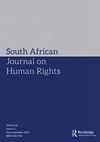Introduction to special issue: Class action litigation in South Africa
IF 0.6
4区 社会学
Q3 LAW
引用次数: 0
Abstract
This special issue on class action litigation in the South African Journal on Human Rights was initiated by a call for papers that was drafted by South African lawyer Carina du Toit. It was indeed she who had originally conceived of this idea for the special issue, identified potential authors who were working in this field and co-chaired (with me) an authors’ colloquium webinar that the South African Journal on Human Rights organised on 26 June 2020. With this substantial basis, I was happy to take the idea forward through to publication on behalf of the Journal. The call for papers that was circulated in October 2019 triggered a lot of interest from academics and practitioners alike. However, like so many other initiatives, the global Covid-19 pandemic caught us entirely off-guard, and between lockdowns, home schooling, rising infection rates and hospital admissions, campus closures and other unprecedented disruptions, we were forced to improvise, and to sharpen our IT skills. What would have been an in-person colloquium in Johannesburg became an online webinar through Zoom. Rather than meet and discuss in person, we resorted to email, Skype, Teams, Zoom and other forms of internet-based communication. But we managed in the end to produce a special issue that covers the topic well, consisting of three case notes and four full-length articles from top scholars and experienced practitioners. Human rights litigation has been a recurring topic in the Journal since we were first established as the Lawyers for Human Rights Bulletin in the late-1970s, which was renamed the South African Journal on Human Rights in 1985. Since 1994, public interest litigation has received increasing attention. A 2011 special issue on that topic – coedited by Jackie Dugard, Jonathan Klaaren and myself – also touched on the challenging prospects of bringing class actions, namely: Stuart Wilson’s contribution on housing rights. However, specific and comprehensive attention to class actions, as a particular form of legal mobilisation, has received less attention. This is of little surprise since, as Cheryl Loots observed already in 1994, the opportunities for standing to bring such cases in South African courts have traditionally been restricted, especially prior to the特刊导论:南非的集体诉讼
《南非人权杂志》这期关于集体诉讼的特刊是由南非律师Carina du Toit起草的论文征集活动发起的。事实上,正是她最初为特刊构思了这个想法,确定了在这一领域工作的潜在作者,并与我共同主持了《南非人权杂志》于2020年6月26日组织的作者座谈会网络研讨会。有了这个实质性的基础,我很高兴代表《华尔街日报》将这个想法付诸出版。2019年10月发布的论文征集呼吁引发了学术界和从业者的极大兴趣。然而,与许多其他举措一样,全球新冠肺炎疫情让我们完全措手不及,在封锁、家庭教育、感染率上升和住院、校园关闭和其他前所未有的混乱之间,我们被迫即兴发挥,提高我们的IT技能。原本在约翰内斯堡举行的面对面座谈会通过Zoom变成了在线网络研讨会。我们没有亲自会面和讨论,而是通过电子邮件、Skype、Teams、Zoom和其他形式的互联网交流。但我们最终还是制作了一期涵盖该主题的特刊,其中包括三篇案例笔记和四篇来自顶尖学者和经验丰富的从业者的长篇文章。自20世纪70年代末我们首次成立《人权律师公报》以来,人权诉讼一直是《南非人权杂志》反复出现的话题,该报于1985年更名为《南非人权期刊》。1994年以来,公益诉讼越来越受到关注。2011年的一期关于这一主题的特刊——由杰基·杜加德、乔纳森·克拉伦和我共同编辑——也谈到了提起集体诉讼的挑战性前景,即斯图尔特·威尔逊对住房权的贡献。然而,对集体诉讼的具体和全面关注,作为一种特殊的法律动员形式,却很少受到关注。这并不奇怪,因为正如Cheryl Loots在1994年所观察到的那样,在南非法院提起此类案件的机会传统上受到限制,尤其是在
本文章由计算机程序翻译,如有差异,请以英文原文为准。
求助全文
约1分钟内获得全文
求助全文

 求助内容:
求助内容: 应助结果提醒方式:
应助结果提醒方式:


